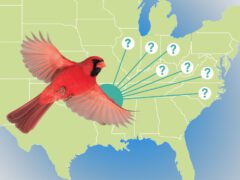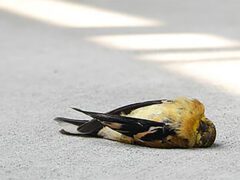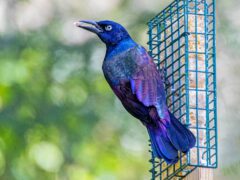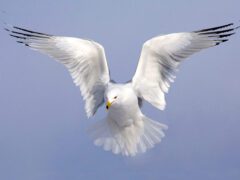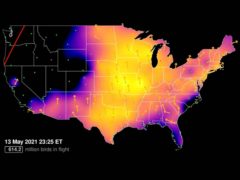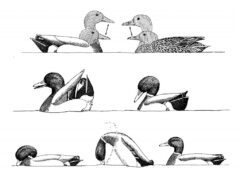The Four Keys to ID
- Size & Shape
This medium-sized flycatcher is long and slender with a long tail. Its head is slightly peaked at the back, making it look rather large headed for its size. It has a medium-sized bill that is thicker than phoebes and Empidonax flycatchers, but smaller than kingbirds.
Relative Size
Larger than a Western Bluebird, smaller than an American Robin.

 robin-sized
robin-sizedMeasurements
- Both Sexes
- Length: 7.5-8.3 in (19-21 cm)
- Weight: 0.7-1.3 oz (21-38 g)
- Wingspan: 11.8-12.6 in (30-32 cm)
© Alex Burdo / Macaulay Library
- Color Pattern
Ash-throated Flycatchers are grayish brown overall with a pale yellow belly and cinnamon edges on the primary feathers in the wing. The underside of the tail has a broad stroke of cinnamon down the center bordered by brownish gray. The cinnamon stripe does not reach the tip of the tail; the tip of the tail is brownish gray. Two whitish wingbars mark the wings. The head and face is uniformly ashy gray with a whitish throat. Males and females look similar.
© Matthew Pendleton / Macaulay Library - Behavior
Like other flycatchers in the Myiarchus genus, these birds tend to lean forward on perches and move their heads up and down, especially when agitated. They also tip their heads side to side while looking around from a perch. Ash-throated Flycatchers spend most of their time at eye level, sallying out from low perches in trees and shrubs to nab an insect or two.
- Habitat
The Ash-throated Flycatcher occupies dry scrub, open woodlands, and deserts in the West. They usually avoid humid forested areas, but do occur in woodlands along streams in dry regions.
© Marc North / Macaulay Library































